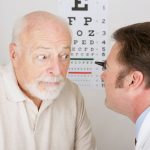 When it comes to keeping ourselves in good health, we’re given a lot of advice. Depending on where you get the advice from, a lot of it can be false. It can make it hard to tell fact from fiction when it comes to advice – because we start to believe it, the more we hear it. As this advice gets passed down through generations, it becomes more and more “factual” over time.
When it comes to keeping ourselves in good health, we’re given a lot of advice. Depending on where you get the advice from, a lot of it can be false. It can make it hard to tell fact from fiction when it comes to advice – because we start to believe it, the more we hear it. As this advice gets passed down through generations, it becomes more and more “factual” over time.
As a doctor, I give advice to my patients. And in return get an opportunity to hear what they may have heard from those around them. Well, with regard to your vision, I want to set the record straight on some of the advice I’ve heard over the years. Here are 7 common beliefs that you should think twice about:
1. Staring at a computer screen will harm your vision
Advertisement
 Whether you have an office job, or you like to spend your evenings catching up with email on your computer, at some point someone may have told you that it’s damaging your eyesight. This advice is only half-true, but false in terms of harming your vision.
Whether you have an office job, or you like to spend your evenings catching up with email on your computer, at some point someone may have told you that it’s damaging your eyesight. This advice is only half-true, but false in terms of harming your vision.
It’s not so much the staring at the screen as it is what your eyes are doing: Staring. When we’re engaged in front of a screen, we don’t blink as much, causing our eyes to dry out and become tired. When this happens, we start to think our vision is getting worse because it may become blurry or foggy. This has little to do with our actual eyesight, and more to do with the condition of our eyes.
So if you do put in long hours in front of a screen, refresh your eyes by blinking or looking away. The better news? You won’t experience long-term damage from computer time.
2. Reading in low light is bad for eyesight
If you find yourself in bed nearly every night with a good book, you may have heard that if the lighting is low it’s harming your eyesight. Well, good news nighttime readers, you’re in the clear!
Similar to staring at a computer screen, you can develop dry eyes, temporary blurry vision, and neck strain. If you still choose to read before bed, remember to blink often and look away – although a good book may make it harder to do that!
3. You’re damaging your vision if you squint
Squinting your eyes to look at something? No worries, you’re not damaging your eyesight but you definitely should get them checked out. When we squint, we’re allowing less light in the eyes and making our pupils smaller. In turn, we develop better focus. Although this won’t cause permanent vision damage, you can develop headaches because of the contraction of muscles.
Your best bet is to see an ophthalmologist to see if you need glasses.
4. Wearing glasses for a long time will make your eyes dependent
Glasses are meant to correct any vision impairments you may have. Some people believe that by using glasses, your eyes will become dependent on them and become worse over time because of “laziness.” To set the record straight, corrective lenses do not worsen your vision or make your eyes work any less.
Over time, you may find your prescription changes and you need a stronger one. This has no relation to the fact you’re wearing glasses. Changes in prescription can occur because of changes in your body which affect vision. So don’t stop wearing your glasses because you think it will harm your eyes – glasses are meant to help.
5. Eat carrots for better eyesight
 This piece of advice has to be the oldest one out there. Although it’s not completely false, you should eat a variety of foods for eye-health nutrients. Carrots have vitamin A, an essential vitamin for our eyes. The problem is, though, unless you have a vitamin A deficiency, loading up on carrots won’t reverse any damage already done to your vision. Also, too many carrots can have you looking like one – your skin will start to turn a yellowish color.
This piece of advice has to be the oldest one out there. Although it’s not completely false, you should eat a variety of foods for eye-health nutrients. Carrots have vitamin A, an essential vitamin for our eyes. The problem is, though, unless you have a vitamin A deficiency, loading up on carrots won’t reverse any damage already done to your vision. Also, too many carrots can have you looking like one – your skin will start to turn a yellowish color.
Stick with a diet that has a range of different foods. You can get vitamin A from leafy greens, eggs, berries and salmon.
6. If your parents have bad eyes, so will you
We like to think that any health misfortune we encounter was passed down to us from our parents. In regard to eyes, this is only partly true. Cataracts, for example, appear with age, but are not hereditary. Whereas studies of the glaucoma, the leading cause of blindness, have revealed that it can be passed down through generations.
Advertisement
In any case, although some health issues you can blame on mom and dad, when it comes to your eyes, it’s not as likely.
7. Vision loss is a natural part of aging
 Your vision is not a reflection of your age, except for cataracts. Although not everyone will develop them, they do occur because of age. Cataracts are not permanent and can be removed, therefore not damaging your vision. So as long as you enjoy a diet rich in eye-friendly foods and get them checked annually, you can maintain your vision for as long as you live.
Your vision is not a reflection of your age, except for cataracts. Although not everyone will develop them, they do occur because of age. Cataracts are not permanent and can be removed, therefore not damaging your vision. So as long as you enjoy a diet rich in eye-friendly foods and get them checked annually, you can maintain your vision for as long as you live.
If you’ve ever encountered any of these pieces of advice, you may want to think twice about believing them. Your vision is important, so keeping your eyes healthy should always be a priority. Keep on reading your books, watching TV and seeing what the world around you has to offer.
